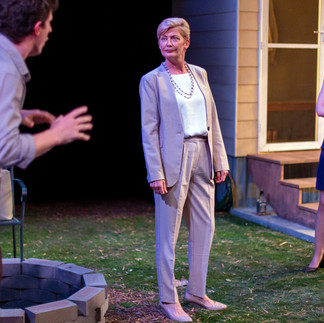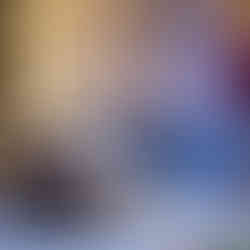Review: Heroes of the Fourth Turning at Seymour Centre
- Apr 11, 2022
- 3 min read
Review by Isabel Zakharova
Most of us can recall this exact situation: it’s the end of a party and almost everyone has gone home, except for a few stragglers. Leaving behind the indoor mess of used cups, crumbs and empty bowls, the remaining partygoers gather in the backyard. Some people are drunk; others are simply too tired to go home. And it’s here, in the cool late night air, where the real conversations seem to occur.
Heroes of the Fourth Turning plants its characters in this exact environment. Four alumni of a conservative Wyoming Catholic college find themselves at a backyard after-party, celebrating their mentor Gina, who has just been inducted as the college president. As the night wears on, pleasantries descend into heated arguments, and we witness a complete unravelling of each character’s worldview. The result is an honest and frightening portrayal of a deeply divisive contemporary America.
Written by Will Arbery (Plano; Evanston Salt Costs Climbing) and directed by Craig Baldwin (Happy Days; John), Heroes of the Fourth Turning is a profoundly realistic piece. This realism is evident in almost every aspect of the play, but nowhere does it shine brighter than in its pacing. Everything happens in real time, and even after we return to the theatre after intermission, we’re exactly where we left off. Baldwin’s precise direction allows for interactions to flow very naturally. Indeed, there were several points where I – as an audience member – too felt like a fellow partygoer who had overstayed their welcome.
Being a sharp and dynamic script, the mood shifts constantly between humour and tension, so the audience’s engagement is never lost. As I watched, I found myself growing to despise certain characters, only to sympathise with them moments later. Even lengthy monologues never felt dull, thanks to brilliant pacing. It was also refreshing to see that Baldwin isn’t afraid of silence. Much like in real life, there were moments of both stillness and awkwardness, when the words don’t come as easily.
The casting of this play is phenomenal – so much so, that you almost can’t imagine anybody else playing these characters. Eddie Orton absolutely shines in his role of Kevin – a dishevelled and confused young man trying to navigate a burgeoning spiritual crisis. Combining tenderness with excellent comedic physicality and frantic stage presence, the audience is never quite sure whether to laugh at Kevin or to feel sorry for him. Providing a strong contrast to his volatility is Teresa, who commands the stage assertively and is unwavering in her political views. Or so she seems. Madeleine Jones’ nuanced performance gives insight into those who hide debilitating fears and insecurities behind a tough exterior. Like everything else in this play, Teresa’s feigned confidence quickly falls apart.
Arbery’s characters are all deeply flawed, which makes them all the more human. I found myself wondering at times who to ‘root for’, but quickly realised that there really is no clear answer. Whether or not you agree with the characters’ views, it’s easy to find at least something to relate to in each of them. Party host Justin seems self-assured but is grappling with feelings of uncertainty and lack of control. Gina’s daughter, Emily, tries to see the good in everyone. And Kevin just really, really wants a girlfriend.
Another standout feature of this play is the naturalistic set, designed by Soham Apte. It’s detailed enough to add yet another layer of realism, but not so much that it distracts from the story. Paired with an authentic soundtrack (Craig Baldwin) of crickets which carries throughout the play, the audience is truly immersed in the space.
Heroes of the Fourth Turning is one of those plays that will imprint itself in your mind even long after seeing it. While some of the American references may go over some Australian audiences’ heads, the themes of political divisiveness, loss of identity and spiritual questioning make it a universal piece. It’s the combination of these ideas with a stellar cast and incisive script, that make this a remarkable piece of theatre – one that is as exciting as it is disturbing.
Image Credit: Richard Farland


































